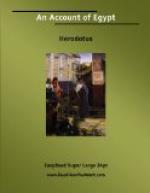Moreover, it is true also that the Egyptians were the first of men who made solemn assemblies and processions and approaches to the temples, and from them the Hellenes have learnt them, and my evidence for this is that the Egyptian celebrations of these have been held from a very ancient time, whereas the Hellenic were introduced but lately. The Egyptians hold their solemn assemblies not once in the year but often, especially and with the greatest zeal and devotion at the city of Bubastis for Artemis, and next at Busiris for Isis; for in this last-named city there is a very great temple of Isis, and this city stands in the middle of the Delta of Egypt; now Isis is in the tongue of the Hellenes Demeter: thirdly, they have a solemn assembly at the city of Sais for Athene, fourthly at Heliopolis for the Sun (Helios), fifthly at the city of Buto in honour of Leto, and sixthly at the city of Papremis for Ares. Now, when they are coming to the city of Bubastis they do as follows:—they sail men and women together, and a great multitude of each sex in every boat; and some of the women have rattles and rattle with them, while some of the men play the flute during the whole time of the voyage, and the rest, both women and men, sing and clap their hands; and when as they sail they come opposite to any city on the way they bring the boat to land, and some of the women continue to do as I have said, others cry aloud and jeer at the women in that city, some dance, and some stand up and pull up their garments. This they do by every city along the river-bank; and when they come to Bubastis they hold festival celebrating great sacrifices, and more wine of grapes is consumed upon that festival than during the whole of the rest of the year. To this place (so say the natives) they come together year by year even to the number of seventy myriads of men and women, besides children. Thus it is done here; and how they celebrate the festival in honour of Isis at the city of Busiris has been told by me before: for, as I said, they beat themselves in mourning after the sacrifice, all of them both men and women, very many myriads of people; but for whom they beat themselves it is not permitted to me




